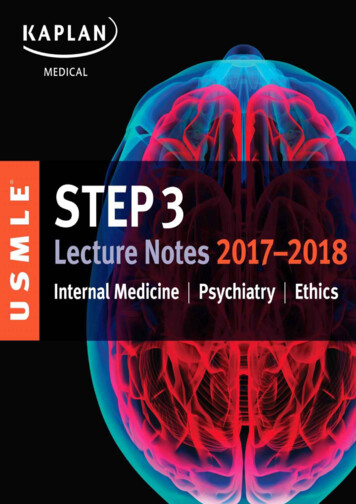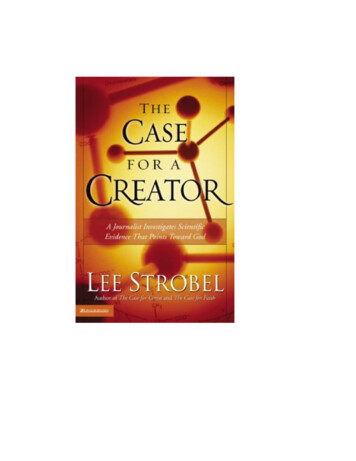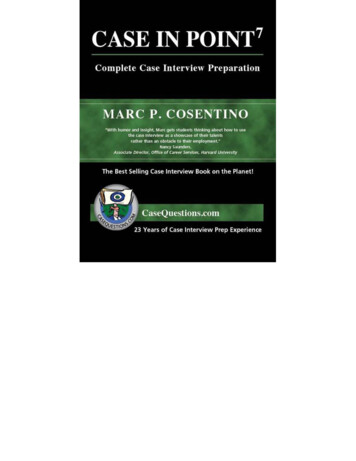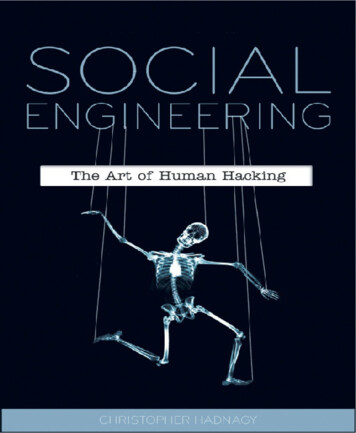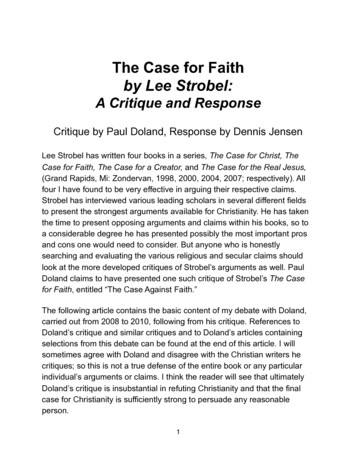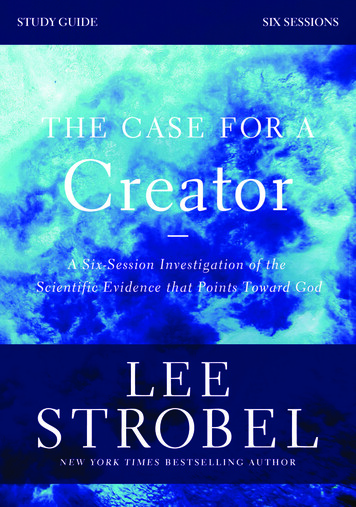
Transcription
S E S S ION 1Science andGodI was convinced that science and faith were at odds — and thatscience definitely had the edge in the credibility department . . .And rather than facing an “unyielding despair” that’s implicit in aworld without God, I reveled in my newly achieved freedom fromGod’s moral strictures. For me, living without God meant living 100percent for myself. Freed from someday being held accountablefor my actions, I felt unleashed to pursue personal happiness andpleasure at all costs . . . As a journalist, I was unshackled to compete without always having to abide by those pesky rules of ethicsand morality. I would let nothing, and certainly nobody, standbetween me and my ambitions.Lee Strobel, The Case for a Creator79780310699590 cs Creator SG int.indd 710/24/13 6:11 PM
8T H E C A S E F O R A C R E AT O R S T U D Y G U I D ERead This!If possible, read the following book content in preparation for your groupmeeting: The Case for a Creator, chapter 4: Where Science Meets Faith, orThe Case for a Creator Student Edition, chapter 1: Science vs. God? Otherwise, read it as follow-up.Watch This!Video Teaching SegmentSpace is provided to take notes on anything that stands out to you.“Ironically, to say that science is the onlybegetter of truth is self-contradicting,because that statement in itself cannotbe tested by scientific method. It’s a selfdefeating philosophical assumption.”— Stephen C. Meyer9780310699590 cs Creator SG int.indd 810/24/13 6:11 PM
9Science and God Discuss This!1. How much confidence do you put in science as a source of truth? Howdid you develop the level of trust (or lack thereof) you currently have?THINK ABOUT THIS!Some people claim that we live in a technological culture where science trumps allother forms of knowledge. Only science is rational; only science achieves truth. Everything else is mere belief and opinion. If something cannot be qualified or tested by thescientific method, then it cannot be true or rational. Science represents the empirical,the hard facts, and the experimentally proven. Everything else can be dismissed asbeing mere opinion, superstition — and mindless faith.2. To what degree do you believe that only science is rational and everything else is mere opinion, superstition, or mindless faith?“It was my science that drove meto the conclusion that the worldwas much more complicatedthan can be explained by science.”— Cosmologist Allan Sandage9780310699590 cs Creator SG int.indd 910/24/13 6:11 PM
10T H E C A S E F O R A C R E AT O R S T U D Y G U I D E3. Has scientific progress made God unnecessary? Why or why not?THINK ABOUT THIS!“The whole point of faith is to believe regardless of the evidence, which is the veryantithesis of science.”Michael Shermer, publisher, Skeptic magazine“Religion is something left over from the infancy of our intelligence; it will fade awayas we adopt reason and science as our guidelines.”Atheistic philosopher Bertrand Russell“Proof is only applicable to very rarefied areas of philosophy and mathematics . . . Forthe most part we are driven to acting on good evidence, without the luxury of proof.There is good evidence of the link between cause and effect. There is good evidencethat the sun will rise tomorrow. There is good reason to believe that I am the sameman as I was ten years ago. There is good reason to believe my mother loves meand is not just fattening me up for the moment when she will pop arsenic into mytea. And there is good reason to believe in God. Very good reason. Not conclusiveproof, but very good reason just the same . . . I believe it is much harder to reject theexistence of a supreme being than accept it.”Michael Green, Faith for the Non-Religious“You can’t absolutely prove — or disprove — the existence of God.”Science philosopher Stephen C. Meyer9780310699590 cs Creator SG int.indd 1010/24/13 6:11 PM
11Science and God 4. To what extent do you think it is possible to prove — or disprove — theexistence of God? In terms of your own investigation, what level ofevidence (or proof) would be sufficient for you to believe or disbelievethe existence of God? How likely is it that there would ever be enoughevidence to eliminate your doubts (one way or the other)? What are theimplications of your answers?“For those who believe in God,no explanation is necessary.For those who do not,no explanation is possible.”— Opening lines of the filmThe Song of Bernadette5. If science is, in fact, the search for truth, should scientists be free toconsider the possibility of the supernatural if the evidence of cosmology,physics, and biochemistry points in that direction? Why or why not?“I believe that the testimony of sciencesupports theism. While there will alwaysbe points of tension or unresolved conflict,the major developments in science in thepast five decades have been running in astrongly theistic direction. Science,done right, points toward God.”— Stephen C. Meyer9780310699590 cs Creator SG int.indd 1110/24/13 6:11 PM
12T H E C A S E F O R A C R E AT O R S T U D Y G U I D E6. Is it possible to believe in science and also believe in God? Can faith inGod ever be rational? Why or why not?“I didn’t see any God out there.”— Yuri Gagarin, Soviet cosmonaut,after orbiting EarthTHINK ABOUT THIS!“You will understand that my atheism was inevitably based on what I believed tobe the finding of the sciences, and those findings, not being a scientist, I had to takeon trust.”C. S. Lewis, Surprised by Joy“I’d have to say that the biggest reason why I don’t believe in god is because thereis no proof of his existence. Throughout the millions of years that man has been onearth, there has never been any solid evidence that there is a creator. If there is agod, wouldn’t he want as many followers as possible? Why leave any doubt? Why notcome to earth and tell everyone he exists? Or, better yet, make it so that everyoneknows he is there.”Norm, in an online discussion9780310699590 cs Creator SG int.indd 1210/24/13 6:11 PM
13Science and God 7. Which of the following “isms” most accurately reflects your currentposition? What influences or factors prompted you to arrive at this perspective? How long have you held this position? Agnosticism: the belief that knowledge of the existenceor nonexistence of God is impossible Atheism: the disbelief in the existence of God Deism: the belief in a supreme being who remains unknowableand untouchable and permits the universe to run itself accordingto natural laws Fideism: the belief that matters of religion are not supportedby evidence or reason and all that is required is faith Pantheism: the belief that God and the universe are one Polytheism: the belief in many gods Theism: the belief in the existence of God“All I have seen teaches me to trustthe Creator for all I have not seen.”— Ralph Waldo Emerson9780310699590 cs Creator SG int.indd 1310/24/13 6:11 PM
14T H E C A S E F O R A C R E AT O R S T U D Y G U I D ETHINK ABOUT THIS!“Some claim science and faith are fundamentally at odds. Others have said scienceand faith represent two separate and distinct realms that don’t and can’t interactwith each other. However, I personally take a third approach, which is that scientificevidence actually supports theistic belief. In fact, across a wide range of sciences,evidence has come to light in the last fifty years which, taken together, provides arobust case for theism. Only theism can provide an intellectually satisfying causalexplanation for all of this evidence.”Stephen C. Meyer8. Are science and faith at odds? Can science and faith ever be compatible? Must a science-minded person reject religious beliefs? Explain youranswers.“God gave us . . . two powerful andwell-matched abilities: to prove thingswe find hard to believe and to believein things we find hard to prove.”— Michael Guillen, Can a SmartPerson Believe in God?9780310699590 cs Creator SG int.indd 1410/24/13 6:11 PM
15Science and God THINK ABOUT THIS!“I believe only and alone in the ser vice of J esus Christ. In him is all refuge and solace.”Johannes Kepler, who discovered the lawsof planetary motion and elliptical orbits“At the center of every human being is a God-shaped vacuum which can only befilled by Jesus Christ.”Blaise Pascal, father of the mathematical theoryof probability and combinational analysis“If we need an atheist for a debate, I’d go to the philosophy department — the physicsdepartment isn’t much use.”Charles Coulson, an architect of molecular orbital theory“I think of God as the greatest scientist. We human scientists have an opportunityto understand the elegance and wisdom of God’s creation in a way that is trulyexhilarating. When a scientist discovers something that no human knew before, butGod did — that is both an occasion for scientific excitement and, for a believer, alsoan occasion for worship.”Francis Collins, director of the Human Genome Project,which first mapped all the genes of human beings9. To what extent can we separate ourselves from our own biases? Howmuch do our religious or atheistic preconceived notions and worldviewtaint the conclusions we draw? How might your current view of God — positive or negative — affect the way you assess the scientific evidencefor his existence?9780310699590 cs Creator SG int.indd 1510/24/13 6:11 PM
16T H E C A S E F O R A C R E AT O R S T U D Y G U I D ETHINK ABOUT THIS!“Question boldly even the existence of God.”Thomas Jefferson“Do not be afraid to be free thinkers. If you think strongly enough, you will be forcedby science to the belief in God.”William Thompson, physical scientist and teacher“Let’s have a new period in the history of science where we have methodologicalrules that actually foster the unfettered seeking of truth. Scientists should be allowedto follow the evidence wherever it leads — even if it leads to a conclusion that makessome p eople uncomfortable.”Stephen C. Meyer9780310699590 cs Creator SG int.indd 1610/24/13 6:11 PM
17Science and God OPTIONAL DISCUSSION QUESTIONSfor Those Investigating Chris t ian ity Is there any limit to what man can discover scientifically? If so, what arethe limits of science? If not, what are the possibilities? Which of the following statements do you think are true in spite of the factthat they cannot be tested or validated scientifically? What are some otherexamples of traits, values, or truths that exist but cannot be explained byscience alone?– Humans have the capacity to love.– Humans have the capacity to self-reflect.– Humans have consciences.– Humans are creative creatures.– It is better to love than to hate.– It is wrong to murder an innocent person. Because scientific theories can change over time, how reliable is what welearn from science today? To what extent do you think future scientificdiscoveries will disprove current scientific understanding? Do most p eople you know believe that Chris tian ity and evolution areeither/or concepts or both/and ideas? Do you agree with Lee’s conclusionthat if life emerged out of naturalistic circumstances, God is out of a job? Physicist John Polkinghorne asserts that science and religion are friends,not foes, united by the common quest for knowledge. Do you agree withthis assertion? Are you open to the possibility? Why or why not?9780310699590 cs Creator SG int.indd 1710/24/13 6:11 PM
18T H E C A S E F O R A C R E AT O R S T U D Y G U I D EBetween SessionsPersonal Reflection“For I know the plans I have for you,” declares the Lord, “plans toprosper you and not to harm you, plans to give you hope and a future.Then you will call on me and come and pray to me, and I will listento you. You will seek me and find me when you seek me with all yourheart.”(Jeremiah 29:11 – 13)1. Do you gravitate toward or away from scientific inquiry? What aboutreligious inquiry? How curious are you about God?2. Carefully meditate on the above verses from Jeremiah and just imaginethese are God’s words to you personally. What is your response? Are youskeptical? Bemused? Cynical? Or do you feel a spark of hope that thisconcept might be real? Try this exercise: Suspend your disbelief, just fora moment, and consider the possibility that God is real, that he caresabout you, and that he invites you to seek and find him. How does thispossibility impact you?9780310699590 cs Creator SG int.indd 1810/24/13 6:11 PM
19Science and God 3. Now reread the promise made to you in the last sentence of the Jeremiahpassage. What if God is real and keeps all his promises? Notice, though,that the promise is conditional — you must do your part. How willingare you to seek truth sincerely with your whole heart and to follow theevidence wherever it leads? What might hold you back from such anopen-minded search?4. Jesus once had a conversation with one of his followers who admitted tohim, “Lord, I believe, now help me with my unbelief!” Can you relate inany way to this man’s honest and heartfelt plea? How surprising is it toyou to discover that the Bible identifies many people who faced doubtsabout God, and yet he answered them? You can rest assured that Godwelcomes your objections, questions, and doubts — and that he eveninvites you to come to him with your unbelief!9780310699590 cs Creator SG int.indd 1910/24/13 6:11 PM
20T H E C A S E F O R A C R E AT O R S T U D Y G U I D EPersonal ReadingPlease read the following book content in preparation for session two:The Case for a Creator, chapter 2: The Images of EvolutionThe Case for a Creator, chapter 3: Doubts about DarwinismOr, The Case for a Creator Student Edition, chapter 3: ExploringEvolution9780310699590 cs Creator SG int.indd 2010/24/13 6:11 PM
The Case for a Creator Student Edition, chapter 1: Science vs . God? Other-wise, read it as follow-up . Watch This! Video Teaching Segment Space is provided to take notes on anything that stands out to you. “Ironically, to say that sci
